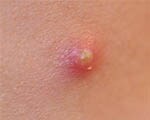Severe acne raises suicide risk, and patients taking isotretinoin (Accutane) for the skin condition should be monitored for at least a year after treatment.

Isotretinoin is used to treat severe acne and the treatment can be effective but there have been reports linking the drug to depression and suicidal behaviour. However studies have had conflicting results. Assuming that acne sufferers are at a higher risk of suicide, regardless of whether they are on isotretinoin, researchers investigated suicide attempts before, during and after isotretinoin treatment for severe acne.
For the study, researchers collected data on 5,756 Swedish people treated for severe acne with Accutane from 1980 to 1989. The average age of the men was 22 years and the average age of women was 27 years.
Linking these patients to hospitalisation and death records from 1980 to 2001, it was found that 128 of the patients were hospitalised because of a suicide attempt. The authors also found that between one and three years before starting isotretinoin treatment the number of suicide attempts increased, but the highest risk was seen in the six months after treatment ended.
It was speculated that the increased risk after starting isotretinoin might be because patients whose acne and physical appearance improved following treatment were distraught if there was no improvement in their social life. But the authors believe it is impossible to say for certain that the continued rise in suicide risk is due to the natural course of severe acne, or to negative effects of the treatment. It was concluded that the most important proactive measure to be taken would be to closely monitor all patients' psychiatric status, not only during treatment, but also for at least a year after treatment with isotretinoin. In addition, it is not only important to monitor the mental health status of patients receiving isotretinoin but also sufferers of severe acne who are not on treatment.
DoctorNDTV is the one stop site for all your health needs providing the most credible health information, health news and tips with expert advice on healthy living, diet plans, informative videos etc. You can get the most relevant and accurate info you need about health problems like diabetes, cancer, pregnancy, HIV and AIDS, weight loss and many other lifestyle diseases. We have a panel of over 350 experts who help us develop content by giving their valuable inputs and bringing to us the latest in the world of healthcare.












